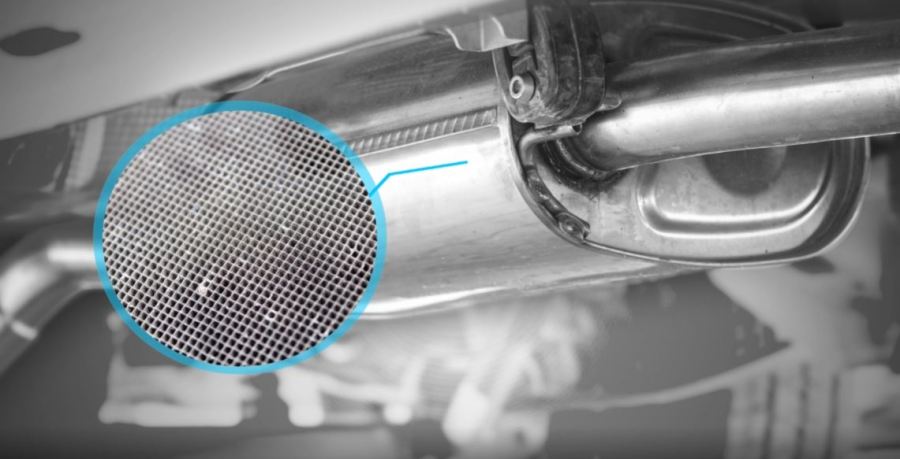MEMPHIS, Tenn. — Catalytic converter thefts are up 400% in Memphis as a new state law takes effect Thursday to help address the problem.
The essential auto part controls emissions from your car, but it’s made with precious metals that make it valuable to thieves. It takes a matter of minutes for them to saw it off, leaving the driver with a big bill to fix it.
Vincent Clark said only his dogs and a camera noticed a vehicle pull up behind his Honda CRV in the Berclair neighborhood of Memphis.
Seconds later, someone gets out and saws off his catalytic converter, leaving the wires dangling. It only takes about 15 minutes. Then the person casually walks back to the passenger side and the vehicle drives off.
Clark didn’t know what happened until later that morning when he tried to go to work. When he cranks up his vehicle now, it makes a sound he described as “louder than hopped-up Mustangs.”
He knew immediately his catalytic converter was stolen because unfortunately, he heard it before. Thieves had stolen his converter two times in less than a year.
The price each time to fix it: about $1,500. Clark reported the second theft to police. He said he hasn’t replaced the part since it will exceed the vehicle’s value.
Around the same time officers were called to the Frayser neighborhood, where Deandre Brown runs a non-profit that helps former offenders find stable jobs.
The first time the thieves hit, Brown says they swiped five catalytic converters off his vehicles. Then they came back a second time about three weeks ago and took four more, and damaged a transmission.
“I’m mad as hell,” he said. “We’re already on a shoestring budget and attempting to keep the lights on every week, so they have to spend $4,000 that wasn’t in the budget. It’s extremely frustrating.”
WREG requested the numbers from Memphis Police.
- In 2019, MPD reported 105 catalytic converters were stolen.
- In 2020, that number jumped dramatically to 515.
- Already this year, between Jan. 1 and May 20, police report 486 stolen.
Shelby County Deputies also seeing similar trends. WREG found out they only had two reports of catalytic converters stolen in 2019. Last year that number rose to 71 reports, and already this year, 70.
But those are only the numbers that are reported to police.
“I can assure you that none of the ones that we’ve done had no police report on it,” said Billey Holley, who owns an automotive shop off Summer Avenue. “They have to pay for it. They have no insurance.”
He says the catalytic converter sits between the car’s engine and the muffler.
“It converts hydrocarbons basically into water. That’s why you see a lot of water dripping from it,” Holley said.
The part reduces emissions with its honeycomb interior, coated in precious metals that speed up chemical reactions.

Due to stricter car emissions around the world, those metals have recently skyrocketed in cost — including rhodium. It’s selling around $22,000 per ounce right now, 11 times the price of gold.
Thieves have been targeting hybrid vehicles, or vehicles with a higher clearance. Depending on the car it can cost between $500 and $2,000 to replace. If you have insurance, some costs may be covered, but there’s still a deductible.
“We saw a lot of these units being stolen from cars across the state,” said Tennessee Rep. John Gillespie from Memphis.
Gillespie helped pass a law that went into effect July 1, requiring a scrap yard or auto part dealer to collect information when they buy or sell unattached, used catalytic converters.
“It’s no different than if you were to go to a pawn shop right now and sell a watch. They ask for your drivers license just in case you stole it,” Gillespie said.
Local law enforcement will have access to the registry.
Gillespie said it also expands the existing law so that, if you’re driving down the street with three or four unattached catalytic converters in your car, now the assumption is you have that illegally. It’s contraband, and you can face charges and fines.
→ Sign up for WREG’s newsletters in your email inbox each day
Memphis Police are also asking drivers to start taking precautions to protect themselves. They suggest you:
- Park in a well-lit area and close to a building entrance.
- Have the converter welded to your car’s frame.
- Consider engraving your VIN on the part.
- Calibrate your car’s alarm to set it off when it detects a vibration.





































